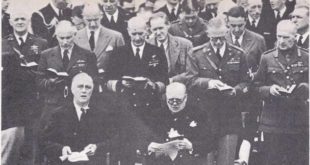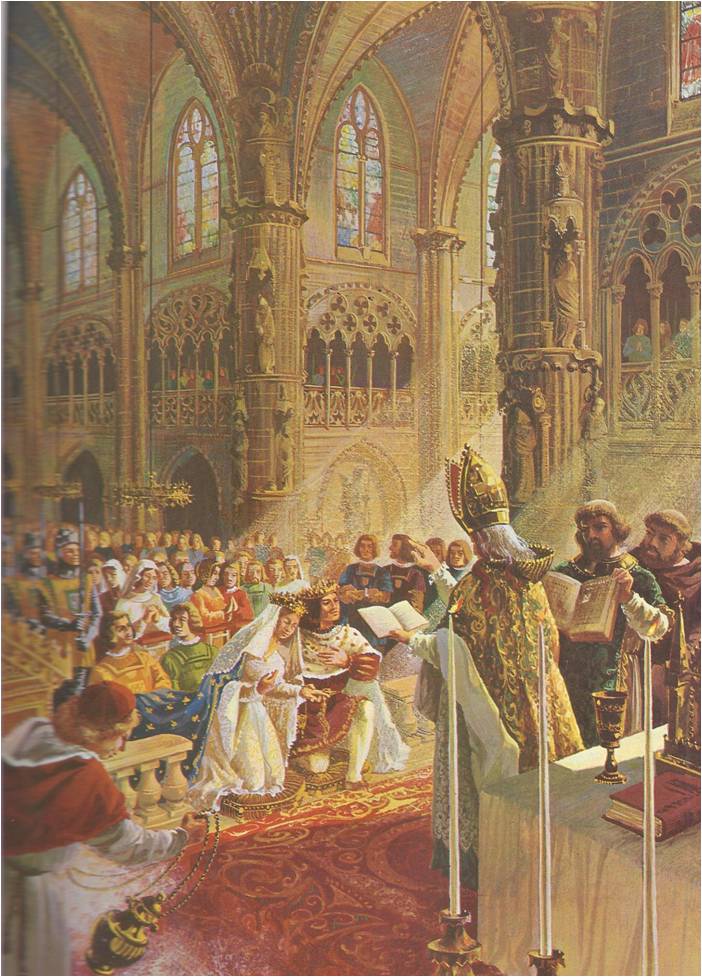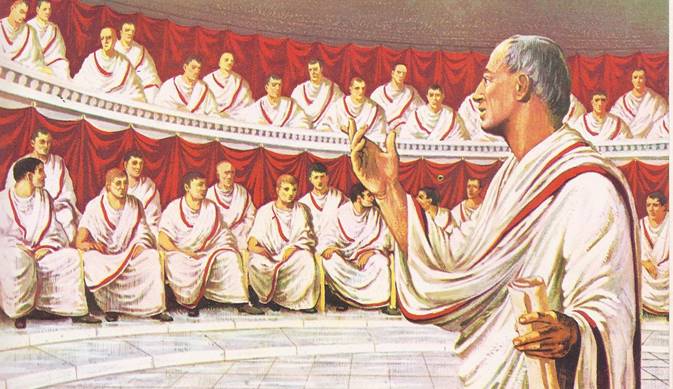If you had been a citizen of the ancient Greek city of Athens on a fine spring morning in 409 B.C., you would have gathered with thousands of your fellow citizens on a hillside inside the city. You would then have listened carefully to the discussion of various matters of business, conducted by the chairman and secretary of the meeting from a platform below and facing you. You would have seen an Athenian citizen thread his way from the hillside to this platform. This was a sure sign that he had a proposal to make to the voters. The citizen …
Read More »Victory in Europe 1941 – 1945
Even before Pearl Harbour, there had been cooperation between the United States and Britain. In August of 1941, President Roosevelt and Prime Minister Churchill met secretly, on a cruiser at sea off the coast of Newfoundland. There they drew up the Atlantic Charter, a document stating the principles on which they based their hopes for a better future for the world. They pledged that neither country would seek more territory. They hoped that, “after the final destruction of Nazi tyranny,” all men in all lands could “live out their lives in freedom from want and fear,” and they called on …
Read More »Ferdinand and Isabella Unite Spain 1469-1700
IT WAS Wednesday, October 18, 1469 and Princess Isabella of Castile and Prince Ferdinand of Aragon were being married. At the end of the beautiful ceremony, the two thousand guests cheered and the entire city of Valladolid began a week of celebration. Isabella was overjoyed, for she loved her husband and he loved her. They seemed well matched. Isabella was eighteen, tall, blonde and blue-eyed – “The handsomest lady I ever beheld‚” one nobleman said. Ferdinand was slightly shorter than his wife, but he was handsome. Isabella was intelligent, very religious and strong-willed. Ferdinand, too, was intelligent and he was …
Read More »The Renaissance in the North and Spain 1400 – 1598
Through the bustling market-towns of the Low Countries passed the traders, goods and gold of all Europe. Here the luxuries of Asia — spices‚ silks, jewels and perfumes — were exchanged for the practical products of the North — woolen cloth and utensils of iron and copper and wood. In shops and inns, wily Italian shippers and bankers bargained with the solemn, solid merchants from Germany and Flanders — and made the profits that built the Renaissance cities of Italy. In tall-spired cathedrals, in palaces, guildhalls and universities, wandering Italian artists discovered works of art and scholarship as great as …
Read More »The Crusades 1096-1260
ON A COLD NOVEMBER DAY IN 1096, a great crowd of people gathered in a field at the town of Clermont in France. They had come from miles around and near them were pitched the tents they had put up for shelter. For some days, Pope Urban II had been holding a great council of cardinals, bishops and princes. Today he was to speak to the people and so many wanted to hear that no building was large enough to hold them all. A platform had been built in the center of the field and as Pope Urban stepped up …
Read More »Feudal Germany 936 -1250
THE WINTER of 1077 was one of the coldest on record in Italy. Ice and snow choked the mountain passages in the north and snowdrifts were piled high well into the south — as far south as the castle of Canossa, which was southeast of Parma. The fortified castle belonged to the countess of Tuscany and here Pope Gregory VII had taken refuge, fearing an attack by his enemies. On January 25, a man stood outside the Castle gate, barefoot in spite of the snow and cold. He was no ordinary penitent come to ask forgiveness of the pope. He …
Read More »Fury from the North 814-1042
“. . FROM THE FURY OF THE NORTHMEN, Good Lord, deliver us.” Until recent times, this line was included in the prayer book used by the Church of England. The raids of the Norse Vikings on Britain were so terrible that the victims never forgot them. For generations the memory of the savage Norsemen was kept alive and Englishmen repeated this prayer for more than a thousand years. It was not only Britain that felt the fury of the Norsemen; they raided the European continent as well. The Norsemen’s ships themselves seemed to threaten terror. The hull of a Viking …
Read More »Christian Knights and Mongol Horsemen A. D. 099-1404
THROUGHOUT THE eleventh century, the divided Arab Empire became weaker in all its parts. Meanwhile, the Christian lands to the north became stronger. Adventures from northern France snatched Sicily and Southern Italy from the Arabs. The pope called on the rulers of Europe for a united Christian attack on the Moslems. By the end of the century, European knights in chain-mail armour were streaming into Syria by land and sea, determined to recapture the holy places of their religion. This campaign was the first of many. The Crusades dragged on for two centuries, with long periods of peace coming between …
Read More »Rival Caliphs and Amirs in the West A.D. 750-1492
IN 750, when the first Abbasid caliph ordered a wholesale massacre of the family that had ruled before him, hardly any of the Omayyads came out alive. One who did was a twenty-year-old youth named Abd-al-Rahman, a grandson of the tenth Omayyad caliph. Fleeing from a Bedouin camp on the Euphrates, he wandered in disguise through Palestine, Egypt and North Africa. Again and again he barely escaped being discovered and seized by Abbasid spies. His desperate flight lasted, altogether, five years. Finally he came to the town of Ceuta, on the northwest coast of Africa, where some Berber chieftains, who …
Read More »The City Divided 130 B. C. – 70 B. C.
MARCUS TULLIUS CICERO, a young statesman known for his dramatic speeches, stood before a panel of judges in a courtroom in Rome. He stared at them angrily. For fifty days he had travelled through Sicily, collecting facts about the crimes committed by Caius Verres, the man who was on trial. Now the judges had told him that there would not be time to listen to his evidence. Cicero knew that the judges had been bribed. For it was no ordinary criminal that he meant to send to prison or to death. Caius Verres was an aristocrat and a senator and …
Read More »








